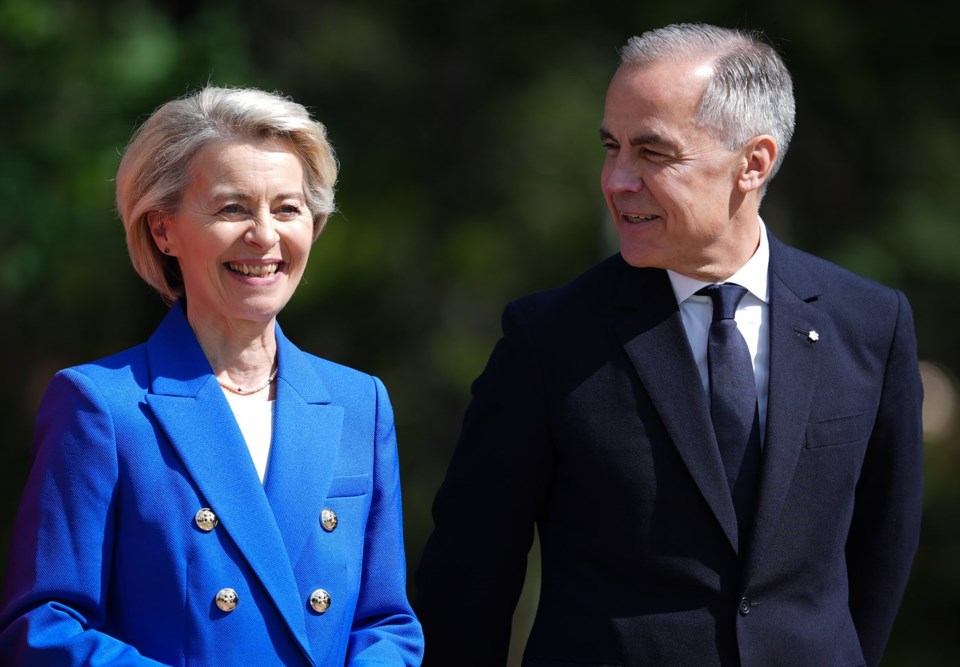OTTAWA — A security and defence partnership pact Prime Minister Mark Carney will sign with European leaders in Brussels on Monday will be among the most wide-ranging agreements with a third country Europe has ever reached, a senior EU official said on Friday.
Carney is flying to Europe Sunday for a Canada — EU Summit, planned for Monday evening with European Council President António Costa and European Commission President Ursula von der Leyen.
At the G7 summit in Alberta on Monday von der Leyen confirmed that the agreement will be signed on Monday in Brussels, calling Canada a "key partner."
“This is also a moment where we can strengthen Canada’s role in Europe’s rapidly evolving defence architecture,” said Von der Leyen on June 16.
In a briefing to Canadian and European reporters on Friday, a senior European official said there will be two main outcomes from the summit — a joint statement that expresses views on global issues, such as conflicts in Ukraine and the Middle East, as well as the signing of the "EU Canada Security and Defence Partnership Agreement."
"This is an ambitious one," the official said. "And actually we've had this with a number of global partners, but the one with Canada would be one of the most far reaching of its kind that the EU has ever signed with a third country. It will open up new avenues for joint work on crisis management, military mobility, maritime security, cyber and cyber threats, and defence industrial co-operation."
Carney has been clear that he intends to expand Canada's ties with Europe as its relationship with the United States strains under the weight of tariffs and threats of annexation. Within two days of being sworn in as prime minister in March Carney flew to Europe, meeting with French President Emmanuel Macron in Paris and British Prime Minister Keir Starmer in London.
It was during those meetings that he seriously began talking about signing on to Europe's new defence procurement plan known as ReArm Europe.
In the throne speech on May 27, Carney's government pledged to join that program, and he told the CBC in an interview that same day he expected Canada to do that by July 1.
On June 9, Carney announced a massive investment in Canada's defence budget to push Canada above the two per cent of GDP NATO target this country has promised — and failed — to meet for more than a decade.
Joining ReArm Europe is part of that plan, with Carney repeatedly saying Canada can no longer put all its defence spending into the U.S.
"We are in close discussions with our European partners to join ReArm Europe," he said on June 9. "That will be an element of diversification. That's just smart. It's better to be diversified. It's better to have options. It's better to have different supply chains and broader partners."
The agenda for the summit posted by the European Council says the security and defence procurement agreement will allow Canada to join a European loan program for joint defence projects.
That 150-billion euro program — called Security Action for Europe, or SAFE — is part of the ReArm Europe initiative.
The EU official said on Friday that once the procurement agreement is in place, Canada will have to negotiate a bilateral agreement with the European Commission to begin discussions with member states about procurement opportunities.
Leaders at the EU-Canada summit are also expected to discuss global trade and the wars raging in Ukraine and the Middle East. They will also commit to fully ratifying the Comprehensive Economic and Trade Agreement, the Canada-Europe free trade agreement known as CETA.
Fen Hampson, a professor of international affairs at Carleton University, said Carney also should put the "pedal to the metal" on ratifying CETA. The deal entered into force provisionally in 2017, but several EU member states still need to ratify CETA at the national level.
"The real challenge there is to get Canadian businesses and also European businesses to take it up … and to start doing more business across the Atlantic, but that also requires political leadership," Hampson said. "It hasn't been fully ratified but that's something (Carney) can perhaps impress upon the Europeans."
After Brussels, Carney will travel to The Hague for the NATO leaders' summit, where discussions are expected to push forward on increasing the NATO members' defence spending target as high as five per cent of GDP, from the current two per cent.
— With files from Kyle Duggan, Dylan Robertson and The Associated Press
This report by The Canadian Press was first published June 20, 2025.
Catherine Morrison, The Canadian Press




